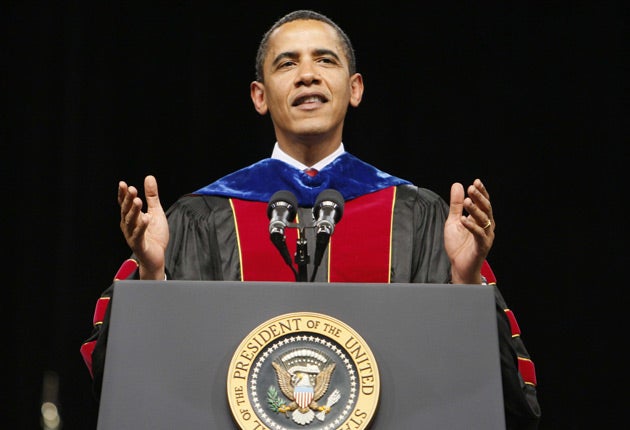Don't surprise me with strike on Iran, Obama warns Netanyahu
Secret envoy brings stern message on eve of Washington meetings

Israeli Prime Minister Benjamin Netanyahu flies to the US for talks with President Obama next week, having already been warned not to "surprise" Washington with an Israeli military operation against Iran, according to the liberal daily Haaretz.
On the eve of talks which are seen as crucial to defining the future of the Middle East peace process, the US President was reported to have dispatched an unnamed envoy to warn the Israeli leader of US concern that Israel could act unilaterally against Iran.
The message was said to have been conveyed to Mr Netanyahu after an earlier meeting in Washington at which an envoy representing the Israeli Prime Minister had discussed the US President's initiative to open dialogue with Tehran. That meeting was reportedly held with the US Secretary of State, Hillary Clinton, and the President's national security adviser, James Jones.
The report by the paper's normally well informed diplomatic editor, Aluf Benn, pointed as a probable reason for US concern to Mr Netanyahu's pre-election pledge to do "whatever is necessary" to stop Iran acquiring nuclear weapons. It also cited his additional comment after taking office that "We will not allow Holocaust-deniers to carry out another holocaust."
The Prime Minister's office declined to confirm the report last night.
Mr Netanyahu's meeting in Washington comes at a time of increased expectation that President Obama may tell him that the chances of building a powerful coalition-including Arab states – to pressure Iran to abandon its perceived nuclear weapons ambitions –will be enhanced by progress in talks between Israel and the Palestinians on a future two-state solution.
King Abdullah of Jordan, one of the leading figures in the Arab world who is associated with that view, yesterday pressed Mr Netanyahu to commit himself swiftly and publicly to a Palestinian state at a previously unannounced meeting between the two men at the Jordanian Red Sea resort of Aqaba.
Some diplomats believe Mr Netanyahu could be on the verge of declaring for the first time his support for a Palestinian state. While he has said since taking office that he is serious about security, economic and political talks with the Palestinians, he has not yet taken that step.
Meanwhile Mr Netanyahu urged Pope Benedict XVI at a meeting in Israel to speak out against Iranian President Mahmoud Ahmadinejad.
The premier said on Israeli TV last night: "I asked him, as a moral figure, to make his voice heard loud and continuously against the declarations coming from Iran of their intention to destroy Israel."
Earlier, at an open air mass, which was easily the best attended of his five-day tour of the Holy Land, Pope Benedict XVI greeted tens thousands of Catholics and called on Christians and Muslims to "reject the destructive power of hatred and prejudice."
The Pope was again warmly received by pilgrims from several continents as well as a significant contingent of Christian Israeli Arabs.
But several hundred disappointed worshippers were unable to take the sacrament on Mount Precipice, apparently because of a shortage of priests to serveit. One of them, Isobel Agrilea, a 30-year-old Spaniard, said: "This was bad organisation for the eucharist. I think it's really sad."
Join our commenting forum
Join thought-provoking conversations, follow other Independent readers and see their replies
Comments
Bookmark popover
Removed from bookmarks